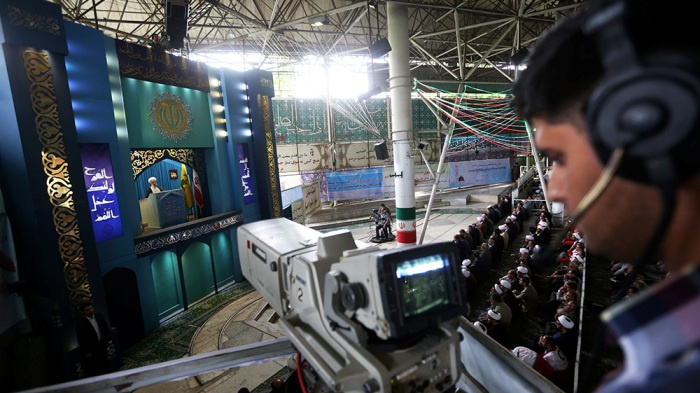Iran’s Friday Prayers: American plots, education and hijab

(Kazem Seddighi, this week's Friday prayers' sermonizer. Photo: Soroush Seyed Jamali/YJC)
This week, across Iran the Friday prayers' leaders used the platform to criticize the United States for not fulfilling its nuclear deal commitments and continuing enmities with Iran. As summer approaches, the appearance of women in larger cities turns into a concern of conservative figures once again, and it was directly expressed in the Friday ceremony. National educational curricula also were not exempt from criticism.
In Tehran, Kazem Seddighi reminded his audience of the United States' continuing plots against Iran. "Resisting the United States means resisting oppression, deception and imperialism," Seddighi said, adding that 'based on Islamic teachings, we can never reconcile with the United States." In Ahwaz, center of the oil-rich Khuzestan Province, Friday prayers' leader Hassanzadeh asserted that Iranians will never forget their battle against the United States, even if the nuclear deal eventually improves the economic conditions. He also asked members of the parliament to maintain their "revolutionary spirit" and do not act passively against the enemies, including the United States. In Rasht, center of the Gilan Province in northern Iran, Friday prayers' sermonizer Gholamreza Shafizadeh also warned the audience that "Iran's enemies do not intend to withdraw" from their previous stance and are planning to "steal Iranian assets", referring to the recent decision by the US Supreme Court to freeze two billion dollars of Iranian money in American banks.
Following the recent controversial decision by the Iranian police to launch an undercover moral security division and set penalties for 'mal-veiled' women, i.e. those who violate Islamic dress codes, Tehran Friday prayers' sermonizer Seddighi thanked the disciplinary force for fighting against the phenomenon, saying that violation of the Islamic dress code "creates a bipolar society and undermines unity". He asked the press to 'wield their pen against' mal-veiledness.
In Mashhad, Ahmad Alamolhoda also slammed non-observance of appropriate dress code in Iranian universities. Friday prayers' leader of Mashhad asked the students not to turn into "pawns of deviant groups" outside the university in this way. "The more moral vice spread across universities, the weaker intellectual and academic movements become," he said, reminding his audience that he was not alien to academic environments. "I administered the most successful of Iranian universities for 23 years," he assured, referring to his years of service as vice chancellor in Imam Sadegh University, the academic institute from which many senior officials of the Islamic Republic have graduated.
Following Ayatollah Khamenei's recent remarks on the English language and his concern on the adverse cultural impact of teaching English in Iran, Friday prayers' imams across the country followed suit, criticizing the monopoly of English. In Tehran, Kazem Seddighi placed the blame on the educational system and textbooks which serve as legacy of the West. "Books delivered to our younger generation do not serve needs of the country," he said, calling for authoring of books which convey Islamic values and stories.

